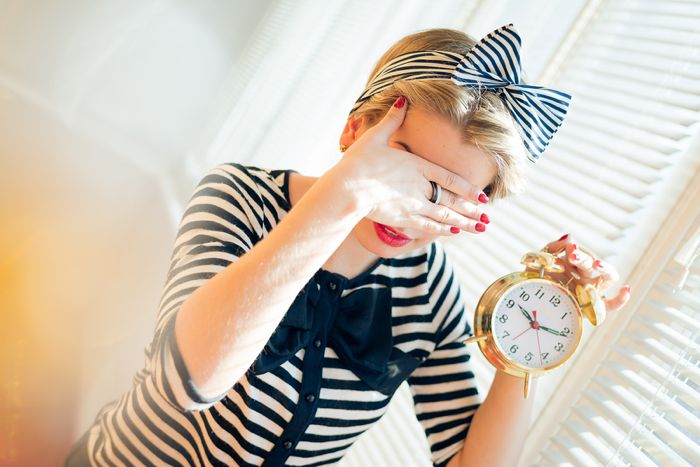Let’s face it. No matter how creative we are, sometimes the ideas slow down.
We get stuck in the mucky middle of the novel. Or no matter how many walks we take, we can’t work out a nasty plot entanglement. Or our characters fall flat, or our blogs run stale.
Sometimes taking some time off is the best approach. But what if you just can’t do that right now? What if you’re on deadline, and you need to produce? What if you need to be creative, but it’s just not happening, and you don’t have a lot of time to win the muse back?
In that case, there are a few tricks you can try. This post deals with one of them.
The solution?
Put the clocks away.
All of them.
Clear them out. Clocks, watches, timers. Hide them. Put them somewhere you can’t see them. Take them off the screen of your cell phone. Put some tape across microwave and other clocks on things you can’t easily move. Get rid of all visible measurements of our 24-hour day.
Why?
We have evidence that running your life by the clock can hinder your creativity.
Clock-Timers vs. Event-Timers
You’ve heard of right-brained and left-brained people. Introverts and extroverts. Type A and type B.
Now you can add “clock-timers” and “event-timers” to the list.
According to recent research, we all fall into one camp or the other.
And you guessed it—one is more conducive to creativity.
You can probably guess which one, but let me give you the details.
Let’s get into some definitions:
- Clock timers use the clock to organize their activities. They get up at a certain time, schedule their activities between this hour and that, and in general run their daily routines by hours and minutes.
- Event-timers don’t pay as much attention to the clock, and organize their day by tasks. They work on one project until they either finish it or reach a stopping point, and then shift to the next. They have a list of things they want to get done, and work sequentially until they either finish them all or run out of juice.
Some more examples: clock-timers wake up with an alarm, while event-timers wake up when they wake up. Clock-timers will call it a night and go home at a certain time, while event-timers will stay as long as they’re enjoying it, and go home either when the event is over or when they get bored.
According to the experts, we all use both of these approaches at different times, but we tend to favor one over the other. We gravitate naturally to either time or events.
Researchers wanted to find out a bit more about each approach. Which is more efficient? Which encourages creativity? Which results in a happier mood?
Which Scheduling Style Encourages Creativity?
Researchers put participants through several experiments. In each one, they had half organize their activities by the clock, and the other half by a to-do list (list of tasks).
The activities included going holiday shopping, performing yoga poses, and planning a project. During the yoga session, for example, half the participants were told to hold a pose for a certain period of time, and clocks were prominent in the room. The other half were told to perform the series of poses, but were given no timeframe, and clocks were not present.
Overall, the results showed a key finding for people who work in creative industries, like writers, artists, and musicians: relying on the clock made people less creative, and less happy.
Why would this be?
Researchers have some theories. First, they think that clock-timers feel less in control of their lives, as if they’re run by the clock and can’t really do what they want when they want. (“I have to work from eight to five, I have to take lunch from twelve to one because it’s the only time the boss will let me, I have to pick up the kids from practice at 6:30, etc.”)
Event-timers, on the other hand, tend to feel more in control, which is naturally associated with happiness. An event timer won’t move on to the next task until he’s done with the first one, so he tends to feel more like he changes tasks when he’s ready, rather than when an outside clock tells him he has to.
Clock-timers also don’t see as much connection between their activities. Instead, they see each in blocks of time—each task in its time slot, with no connection between one and the other. Researchers found that this viewpoint led clock-timers to feel more like the world was chaotic as a whole, driven more by random events than by causality.
The event-timers, on the other hand, were more likely to make connections between events, most likely because they feel like finishing one task leads to starting another—that one is connected to another.
This viewpoint allowed them to feel like actions cause results, and to imagine that they could change things in their lives by taking action, and less like they were ruled by fate.
Some Other Differences that Affect Overall Well Being
The researchers found some other interesting differences.
- Enjoying experiences: Because they were watching the clock, clock-timers were less able to enjoy their activities, gleaning fewer good feelings from them. Event-timers were able to get totally absorbed in their experiences, receiving all the positive benefits and savoring the moment. In one experiment, for example, event-timers were more likely to enjoy playing a card game than clock-timers.
- Remembering experiences: Event-timers also remembered their experiences more positively than did clock-timers. They were able to look back on the card game and remember how much they enjoyed it.
- Taking control of your fate: Because event-timers felt more like events happened because of their actions, they were more likely to believe that they could change things if they didn’t like them. Clock-timers, on the other hand, were more likely to be resigned to their fate.
- Take advantage of opportunities: Clock-timers were less likely to seize opportunities, because they felt like they had to “reschedule” everything and often couldn’t squeeze in anything new. Event timers were more likely to jump at the chance, and take advantage and enjoy the opportunity.
- Ability to meditate or get lost in the experience: During the yoga part of the study, researchers found that clock-timers were less able to reach the complete meditative state, focusing instead on how long they were holding the pose. They were more likely to stop or give up in performing the pose than event-timers. The results suggested that clock-timers may have more difficulty reaching the “flow” state that is so critical for creative work like writing, painting, and composing.
As you start to think about these effects, you can see how your scheduling style could affect a lot of things in your life—not only your creativity and experiences, but your career as a whole, and your ability to change and direct it to reach your goals.
Best to Use a Combination of the Two
Like most things, it’s best not to see one scheduling style as “better” than another. Obviously we all have to live by the clock at times, when we need to attend a meeting, be at work at a certain time, or arrive at an event without being late.
But you’ve probably noticed that in our culture, we’re kind of ruled by the idea of clock-time. If you think about it, this is a relatively new development in our evolution.
Our ancient ancestors, for instance, were more likely to be event-timers, getting up when they felt like it, going on a hunt, and when the hunt was finished, taking the catch home, and enjoying some fellowship around the fire until they fell onto their furs exhausted.
Most work places today, however, worship at the shrine of the clock. In fact, researchers from this study questioned our heavy reliance on this one way of scheduling, suggesting that it could be hurting our overall creativity and productivity:
“It appears that the quasi-adage in economics of clock-time being ‘the one best way’ of organizing activities in modern societies would benefit from a deeper examination through the lenses of social and cognitive psychology.”
You probably know by now which side you tend to feel more comfortable with. So what can you take from this research?
Simply this: if you’re struggling with a project, or wanting to boost your creativity, it may help to get rid of the clocks.
No matter what “type” you are naturally, you may find that like most of us in this modern society, you’ve become a slave to the clock. It’s difficult not to when we’re surrounded by demands on our time.
But that doesn’t mean you can’t take some of your time and approach it differently. Maybe that’s on your weekend, or after work, or if you’re self-employed, on certain days of the week where you don’t have activities scheduled at a certain time.
Give it a try, and let us know your results!
Have you ever put away all the clocks in your house?
Read more about clock timers and event timers in “Overwhelmed Writer Rescue.” Get your FREE chapter now!
“Sources
Sellier, Anne-Laure; Avnet, Tamar, “So what if the clock strikes? Scheduling style, control, and well-being,” Journal of Personality and Social Psychology, November 2014; 107(5): 791-808, http://psycnet.apa.org/journals/psp/107/5/791/.
Bourree Lam, “Clocks Make Workers Less Creative,” The Atlantic, October 6, 2014, http://www.theatlantic.com/business/archive/2014/10/clocks-make-workers-less-creative/381064/.


Having a label for the anxiety I often feel when forced to watch a clock is a gift. I am an event-timer by nature and find my stress level rising whenever I have to watch the clock. I’m going to give some thought to strategies I can use to reframe the clock-timer moments into more of an event-timer feel. For example, if I know I need to be at the doctor at 3, what if I leave a little early and work from a coffee shop for 30 minutes? Or if I have a meeting at work, maybe I grab a coffee with an awesome colleague on the way? Instead of making “being on-time” the goal, I can focus on an experience I can enjoy instead of a deadline I have to meet. Worth a try!
Ooo, what good ideas, Angela. We definitely need ways to get around our clock-centered world. Thanks for getting us thinking about how we might do that!
About the only time I use clock-timing anymore is when I have a real appointment like the dentist — certainly wouldn’t want to miss that. I work from a prioritized To Do list that may or may not have due dates. For me, event-timing is less stressful than clock-timing.
Ha ha. I don’t know, Pat. I think I wouldn’t mind missing the dentist appointment! :O) Sounds like you’re doing a good job resisting the tyranny of the clock, though.
This really got me, Colleen. I am SUCH a clock watcher. I often feel so pressured to stick to my schedule and produce (working looonnnggg days), and I KNOW it hampers creativity. You’ve really given me good science to back this up. And since I SAY my creativity is the most important thing to me, well, guess it’s time to put my life where my mouth is!
Thank you for this!
Oh wow, Susan, you just took science to real life. I think a lot of us feel like you do, these days, pushed by the clock even if we don’t naturally work that way. Good luck finding some time to hide those things away! :O)
I’m going to give this a try. Certainly the opposite is true. When I’m at my most creative, when the words are pouring onto the page, I am utterly and completely unaware of the passing of time.
Same here, Cheryl. Time flies out the window. Who needs a clock?